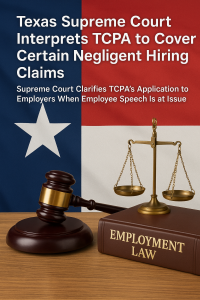Supreme Court Clarifies TCPA’s Application to Employers When Employee Speech Is at Issue
In a significant development for Texas employers, the Supreme Court of Texas has interpreted the Texas Citizens Participation Act (TCPA) to cover certain negligent hiring, training, and supervision claims. In Walgreens v. McKenzie (No. 23-0955), decided on May 16, 2025, the Court held that when an employee’s allegedly tortious speech forms the basis of a claim against an employer, the TCPA can provide a pathway for early dismissal.
Case Summary: False Accusation Leads to Complex Legal Battle
The case arose from an incident at a Houston Walgreens in 2019, where customer Pamela McKenzie was detained on suspicion of shoplifting. A Walgreens employee called the police, alleging McKenzie was the same person who had stolen from the store earlier that day. After reviewing surveillance footage, police determined McKenzie was not the thief and released her. McKenzie claimed other Walgreens employees had agreed she was not the thief, yet the employee called police anyway.
McKenzie filed suit against Walgreens asserting multiple claims, including intentional infliction of emotional distress, negligence, and negligent hiring, training, and supervision (NHTS). Walgreens moved to dismiss under the TCPA, arguing that all claims were based on the employee’s alleged false report to police, which constituted “a communication made in connection with a matter of public concern.”
The Court’s Analysis: Speech as a Component of Employer Liability
Justice Busby, writing for the Court, focused on a key question: Can the TCPA, which protects free speech rights, apply to a negligent hiring claim against an employer when the underlying tortious conduct involves protected speech by an employee?
The Court concluded that it can. The justices disagreed with the court of appeals’ interpretation that the TCPA only applies when a claim is “entirely” based on protected speech. Instead, the Court held that when either the employer’s alleged negligence or the employee’s tortious conduct is based on or in response to the exercise of a protected right, the TCPA applies.
Key Legal Holdings
- The TCPA’s language (“is based on or is in response to”) does not require that protected activity be the sole basis of a legal action.
- An NHTS claim requires proof of both the employer’s negligence in hiring, training, or supervising the employee AND the employee’s subsequent tortious act or omission. When either element involves protected speech, the TCPA applies.
- False accusations about shoplifting constitute “communications made in connection with a matter of public concern” under the TCPA.
- Once the TCPA applies, the plaintiff must establish “by clear and specific evidence a prima facie case for each essential element” of their claim to avoid dismissal.
Implications for Employers and Litigation Strategy
This ruling significantly strengthens an employer’s position when faced with negligent hiring, training, or supervision claims stemming from an employee’s speech-related conduct. However, it’s important to note that the TCPA does not apply to all NHTS claims – only those where protected speech is a component of the alleged tort.
The case also illustrates a critical procedural hurdle for plaintiffs. After determining the TCPA applied, the Court found McKenzie failed to establish a prima facie case because she had identified no evidence regarding:
- The employee’s hiring, training, supervision, or retention
- The applicable standard of care
- How the employee’s hiring, training, supervision, or retention fell below that standard
- How any such breach proximately caused the events in question
Businesses facing NHTS claims should promptly evaluate whether the TCPA might apply and be prepared to file a motion to dismiss if the claim involves employee communications on matters of public concern.
Strategic Lesson for Plaintiffs
Perhaps the most important takeaway from this case involves litigation strategy. The TCPA provides in § 27.003(c) that “Except as provided by Section 27.006(b), on the filing of a motion under this section, all discovery in the legal action is suspended until the court has ruled on the motion to dismiss.” This automatic suspension of discovery creates a significant obstacle for plaintiffs.
When the TCPA applies to negligent hiring, training, and supervision claims specifically, plaintiffs face a substantial challenge because most of the evidence needed to establish such claims is typically outside their control and exclusively in the possession of the defendant employer. The only avenue available is under Tex. Civ. Prac. & Rem. Code § 27.006(b), which allows plaintiffs to file a motion to conduct “specified and limited discovery” to gather evidence about the employer’s hiring, training, and supervision practices.
In cases like this, plaintiffs’ attorneys should consider filing a motion for specified and limited discovery under § 27.006(b) to seek the evidence necessary to establish the elements of their negligent hiring, training, and supervision claims.
Conclusion: Interpreting the TCPA’s Application to Employer Liability
The Walgreens v. McKenzie decision represents a careful interpretation of the TCPA’s statutory language and its application to employer liability claims. While the Court clarified that TCPA protections apply to employers in certain circumstances, it did not give businesses carte blanche to escape liability for negligent hiring practices. Instead, it established that when speech is a component of the allegedly tortious conduct, additional procedural safeguards apply.
For businesses, this ruling offers a potential early exit from litigation when employees’ protected speech is at issue. For plaintiffs, it serves as a reminder of the critical importance of strategic discovery requests when challenging an employer’s hiring, training, and supervision practices under the TCPA framework.
As Justice Busby noted in the opinion, the Court’s ruling “in no way suggests that the Court regards McKenzie’s allegations as specious or her experience as insignificant.” Rather, it represents a methodical application of the TCPA’s statutory language to a novel context, with significant implications for future employer liability cases in Texas.
